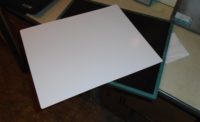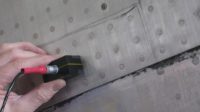The oft-quoted adage is that the shop should always be prepared for an audit. While this saying is true, the average quality manager knows that consistent readiness for such scrutiny calls for continued best practices to be complied with. This article seeks to suggest valid best practices such that a forthcoming audit will be just another validation of the shop’s competency and integrity.
Providing the inspectors with good equipment in the first place can prevent future audit problems. The initial purchase of LED lamps for the wash and inspection stations is relatively expensive but will save money in the long run since the LED bulbs last much longer than traditional mercury vapor lamps. The higher intensity in the wash station prevents underwashing that could prompt reprocessing the parts and the higher intensity in the inspection booth makes it much easier for the inspector to detect any discontinuities. Traditional TAM panels are difficult to keep clean and a continual source of audit exposure. Substituting twin-nickel chrome panels as the system performance tool will ultimately save time and money.
Depending upon the source of the audit, e.g., prime manufacturer, FAA, Nadcap, the source will often provide their checklist in advance to help prepare a shop for the audit. These are the test questions before the test is administered, so a thorough review of said checklist is obviously important. Such review should identify any neglected issue that might prompt a finding as well as prompt data gathering such as calibration certificates that will save time during the audit. The intent should be to scrutinize every page of documentation that the auditor will be looking at. Mistakes are bound to happen, but those errors should be caught before the audit. Having a Level 2 inspector help the Level 3 do the review will not only result in growing the inspector but will also develop the inspector’s awareness to the importance of total compliance to the customers’ requirements.
It should be recognized that most auditors do not solely audit to the specific checklist questions. By relying on their own experience in the inspection method, the auditor is able to detect a problem outside of the scope of the checklist. This is for the Level 3 to mitigate by recognizing any potential audit exposure and having an accurate procedure in place that addresses all customer requirements. Having a good specification effectivity system in place will alert the Level 3 to any potential changes needed for the work instructions. The Level 3 should be periodically reviewing the process control records as the auditor will certainly be looking at them. The auditor will no doubt be looking at the qualification/certification records of the inspectors, so a Level 3 concurrence that all certification exams as well as visual acuity exams are up to date is in order.
Creating a good first impression for the auditor is helpful in the long run. This can be done by presenting a properly maintained line with no penetrant on the floor, nor any developer dust contaminating any surface. A neatly maintained work area speaks to the inspector’s attention to detail. The inspector’s work instructions, whether in print or available by computer should be readily available and up to date. Many shops are using a company-maintained computer tablet that contains all relevant specifications, so the inspector knows they are working to the most recent revision. It is on the company to maintain a specification effectivity system such that, unless the purchase order says differently, the inspector is always working to the latest revision.
Training of the Level 2 undergoing the audit is essential. They should be instructed to:
- Review their paperwork before starting each job to ensure previous operations are complied with and that they do not see any anomalies.
- Have their work instructions and acceptance criteria open and available.
- Never go by memory but be able to point where in the procedure they are working to.
- Make sure they understand the acceptance criteria, the auditor may ask scenario questions.
- Never offer information, only answer the question asked by the auditor.
- If the inspector does not know the answer to the auditor’s technical question, to respond by saying “If I am not sure of something, I ask my Level 3.”
- Never respond to or treat the auditor as an adversary. Auditors are not one’s friend, but neither are they one’s enemy.
Many inspectors, whether they are certified or are a trainee, have a certain fear associated with an audit. The Level 3 can lessen that fear with practice audits and being an encourager to those working the penetrant line. Audits for any approved special process are inevitable, but proper best practices and mindful preparation can make an audit just another day in the shop.



